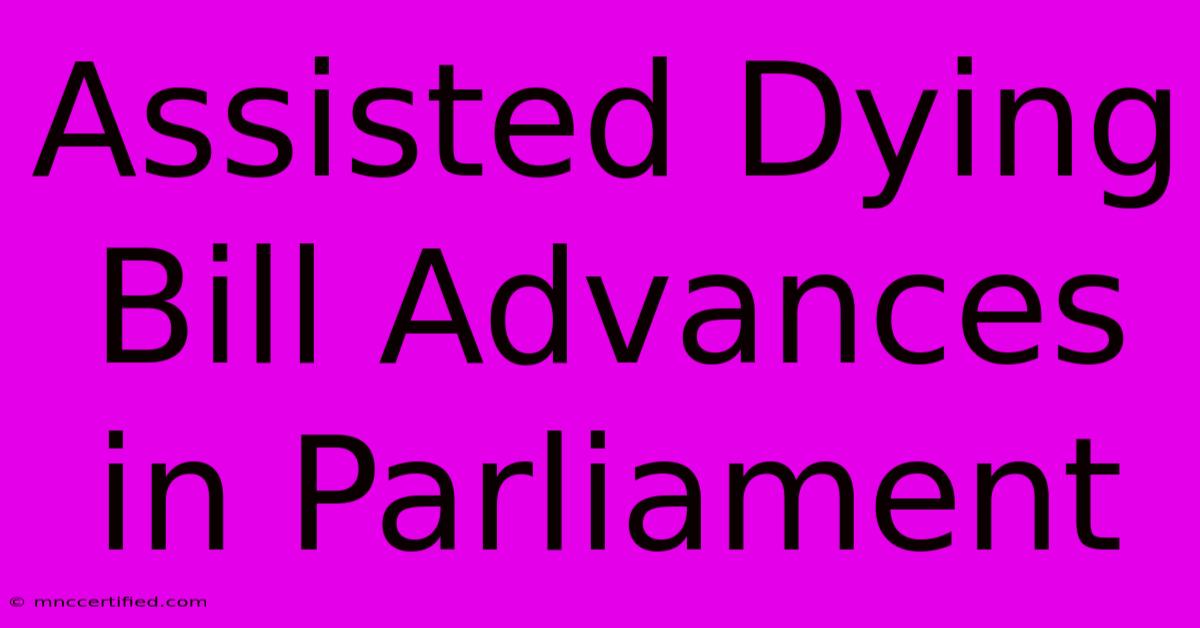Assisted Dying Bill Advances In Parliament

Table of Contents
Assisted Dying Bill Advances in Parliament: A Closer Look at the Debate
The ongoing debate surrounding assisted dying is once again at the forefront of political discussion as a new Assisted Dying Bill progresses through Parliament. This complex issue raises profound ethical, legal, and social questions, sparking passionate arguments on both sides. This article will explore the key features of the current bill, examine the arguments for and against assisted dying, and analyze the potential implications of its passage.
Key Provisions of the Proposed Assisted Dying Bill
The specifics of each Assisted Dying Bill can vary, but common themes include:
-
Eligibility Criteria: Strict eligibility criteria are typically proposed to prevent abuse. These often include terminal illness with a prognosis of less than six months to live, capacity to make informed decisions, and repeated requests for assistance in dying. Strict safeguards are crucial to the bill's design, aiming to balance individual autonomy with protection against coercion or unintended consequences.
-
Independent Medical Assessments: Multiple independent medical professionals would assess the patient's condition, capacity, and genuine desire for assisted dying. This multi-layered approach aims to ensure that all decisions are thoroughly vetted and based on sound medical judgment. Multiple safeguards are designed to minimize the risk of error.
-
Witness Requirements: The presence of witnesses during the process is generally mandated to provide further oversight and accountability. This requirement adds an additional layer of safeguards and transparency.
-
Appeals Process: Mechanisms for appeals and reviews are frequently included to address potential concerns and ensure fairness throughout the process. This appeals process provides an additional layer of protection.
-
Conscientious Objection: The bill typically allows healthcare professionals to opt out of participating in assisted dying procedures if it conflicts with their personal beliefs. This addresses concerns about religious freedom and conscientious objection.
Arguments in Favor of Assisted Dying
Proponents of assisted dying emphasize the importance of patient autonomy and the right to make choices about the end of life. Key arguments include:
-
Dignity and Control: Individuals facing unbearable suffering deserve the option to maintain control and dignity during their final days. They should have the autonomy to choose how and when their life ends.
-
Relief from Suffering: For those experiencing intractable pain and suffering, assisted dying can offer a compassionate and humane alternative to prolonged agony. This aspect focuses on compassionate care in the face of unbearable suffering.
-
Personal Liberty: The right to die with dignity is framed as an extension of broader personal liberty rights. This argument connects assisted dying to fundamental rights of self-determination.
Arguments Against Assisted Dying
Opponents raise various concerns, including:
-
Slippery Slope Argument: Critics fear that legalizing assisted dying could lead to a gradual expansion of eligibility criteria, potentially impacting vulnerable populations. This argument centers on concerns about potential abuse and unintended consequences.
-
Role of Healthcare Professionals: Some argue that the involvement of healthcare professionals in assisted dying contradicts their ethical obligation to preserve life. This emphasizes concerns about the potential erosion of the medical profession's ethical standards.
-
Palliative Care: Opponents emphasize the importance of improving access to high-quality palliative care as a more humane and ethical approach to end-of-life care. Palliative care is presented as a viable alternative that addresses suffering without ending life.
The Ongoing Parliamentary Debate and Implications
The passage of an Assisted Dying Bill will undoubtedly have far-reaching implications. The debate is complex and involves balancing individual rights with societal values. Careful consideration of all perspectives is crucial. Public opinion, medical ethics, and legal precedents all play significant roles in shaping the outcome of this complex debate. Ongoing monitoring of the bill's progress and the arguments surrounding it are essential for a thorough understanding of this crucial issue.
Conclusion: Navigating a Complex Ethical Landscape
The advancement of an Assisted Dying Bill in Parliament highlights a deeply divisive yet vital societal issue. Understanding the various perspectives, safeguards, and implications of such legislation is crucial for informed public discourse and responsible policymaking. This ongoing debate reflects the challenges of navigating a complex ethical landscape where individual autonomy intersects with societal concerns about vulnerable populations and the role of healthcare professionals.

Thank you for visiting our website wich cover about Assisted Dying Bill Advances In Parliament. We hope the information provided has been useful to you. Feel free to contact us if you have any questions or need further assistance. See you next time and dont miss to bookmark.
Featured Posts
-
Metal Bonded Sealing Washers
Nov 30, 2024
-
Update Stephen Mulherns Hospital Stay
Nov 30, 2024
-
What Is A Bonded Title In Ga
Nov 30, 2024
-
Bonding An Above Ground Pool
Nov 30, 2024
-
Ashley Alban Sibling Bonding
Nov 30, 2024